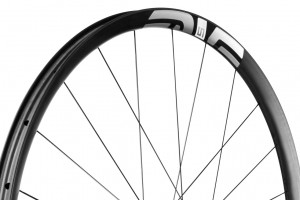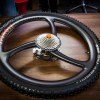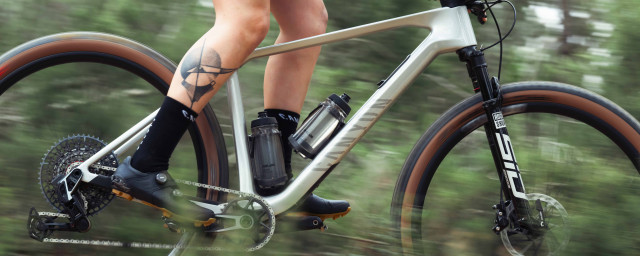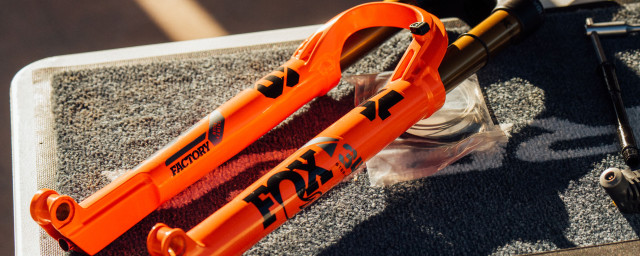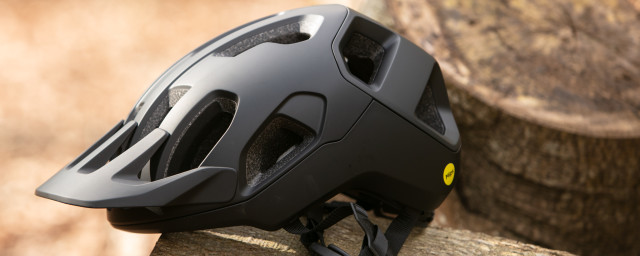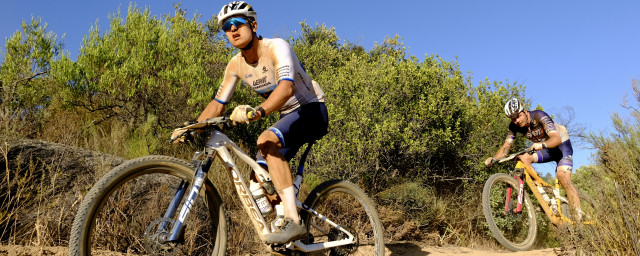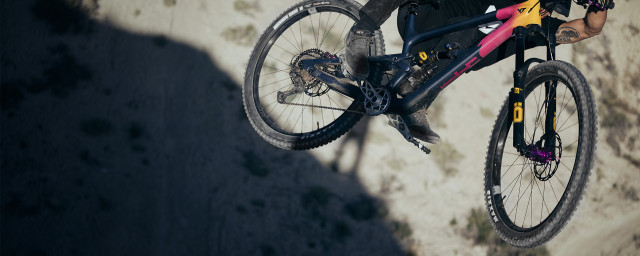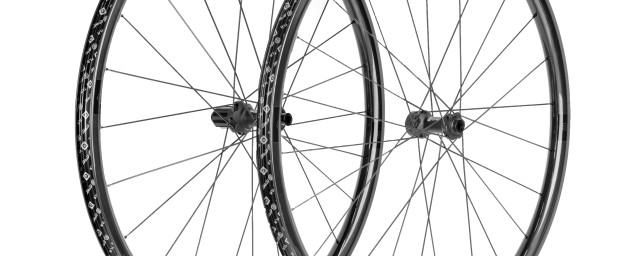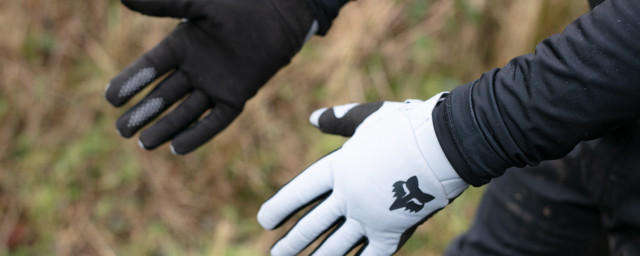ENVE launches new M-Series carbon rims with pinch puncture protection
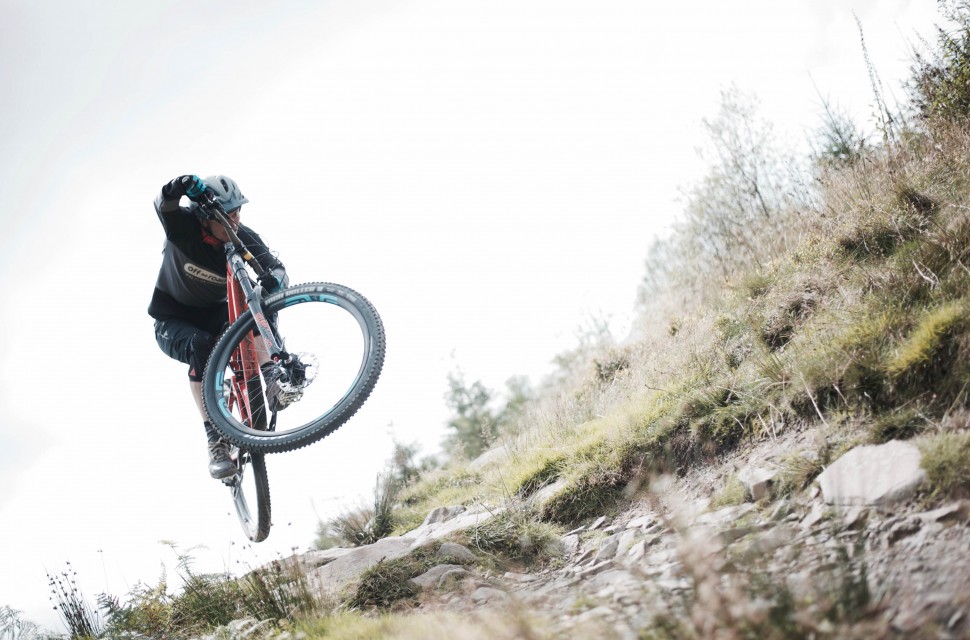
American carbon fibre specialist ENVE has updated their M Series mountain bike rims to make them lighter, more comfortable and stronger, while the harder hitting models in the range now get a clever rim strip that's said to almost eliminate pinch flats.
- First ride: 2018 Cannondale Jekyll 1 enduro bike
- Buyer's guide: everything you need to know about mountain bike tyres
- Review: Stans Notubes Race sealant
It's a massive overhaul, with only a single rim in the now eight strong line-up remaining the same. If you’re unfamiliar with the old range of rims, ENVE split their range up by the percentage of uphill to downhill in the discipline. Their cross country rims were called M50, while the downhill rim was M90 and the trail and enduro M60 and M70 rims sat in the middle.
More widths, more comfort and less weight
For 2018, they’ve expanded on this with more width options, especially in the trail and enduro categories. The internal width in millimetres is now after the rim model so, for example, the cross country rim is now called the M525, being 25mm wide internally. The trail bike ready M6 range now has 30mm, 35mm and 40mm options, while the enduro M7 range gets 30mm and 35mm widths with a tougher e-bike option in the former. At the other end of the spectrum, the dimensions of the downhill race M930 rim should be self-explanatory.
It’s much more than just new names and more option as rims across the board have had the carbon layup has been refined to lower weight and also increase comfort. It’s fair to say that even by the standard of carbon rims, ENVE's were known for being extremely stiff. While lateral stiffness is a boon when it comes to steering accuracy, the fact they were extremely stiff vertically meant that they would transmit an awful lot of trail chatter - and hence fatigue to the rider. ENVE says that their range offers greatly increased comfort thanks to a radically different profile that's much less square than the old ones.
Clever pinch flat protection thanks to a clever strip
Possibly the biggest news from the new range would be the bold claims ENVE are making about improved pinch puncture resistance. On the M5 and M6 range, the width of the hookless bead has been increased to 4.5mm and in conjunction with the new more compliant layup, ENVE claims a 50-60% increase in flat resistance while still being over 30% stronger.
However, it's the M7 and M9 rims that get the really interesting anti-puncture technology. They use a special rim polymer strip that fits over and around the bead of the rim. It too increases the width of the bead to 5mm, but as the strip has some give, ENVE say that it offers pinch puncture protection that's comparable to the best anti-flat tyre inserts on the market while only adding around 130g in weight.
ENVE say the other benefit that the rim strip has is that it will still keep tyre pressure even if the rim becomes compromised. Despite strength being up over the old rims - and massively up over aluminium models they have bench tested - they say that in their tests the rim will actually fail before it pinch punctures. They also reckon that because the pinch puncture protection is so good, riders can often opt for a thinner casing tyre that'll help reduce rotating weight massively.
The rimstrip is an integral part of the rim and requires the carbon portion to be a smaller diameter and specially shaped, so it's not possible to retrofit it to a different rim. It is possible to remove it should you need access to the internal nipples, but ENVE says their rims hardly ever need truing if they're built correctly in the first place. In their testing, the same rim strip was used for impact testing over 50 times and it's still going strong in the real world, so that should prove durable too, but it's easy enough to remove and replace should the worst happen.
How do they ride?
I tested the M730 rims on a borrowed Intense Carbine 29er. I personally reckon it's on big wheelers that you see the most benefit from carbon hoops as the larger diameter wheel is intrinsically more prone to flex. Bike Park Wales is perhaps one of the harshest places to test carbon hoops, thanks to a combination of plenty of rocky tracks that can beat the hell out of your tyres and rim, plus most tracks having a hardpacked but rocky surface that is unendingly hard on the hands.
Subjectively, the new rims do feel much less harsh than the outgoing series and I definitely had less hand pain and arm pump towards the bottom of each run than when I've used them at BPW before, though proper back-to-back testing would be the only way to know just how much difference there is. I'd very much hesitate to call the rims soft by any means - they're definitely still on the stiffer end of the spectrum. Laterally that means excellent steering precision, even with 29" wheels. You can rapidly change direction with no sensation that the wheel is lagging behind what you're doing at the bars. It's worth noting I weigh just 65kg, so I suspect I'm not quite heavily built enough to really take advantage of the added stiffness of carbon wheels full stop.
When it comes to the pinch protection, my first impressions are that the technology does work as advertised. The Maxxis rubber on the bike used the mid-weight EXO casing and starting at 21psi I had no issues, so I lowered the rear tyre pressure until I started hitting the rim on rocky sections at about 19psi. Despite there being obvious hard contact with the ground, the casing stayed intact and the tubeless rubber stayed inflated. To be honest, by that point the tyre was getting noticeably squirmy, so that's not a pressure I'd be running anyway. It's an impressive trick and I reckon that it'll definitely ease the mind of anyone looking at splashing out on such costly hoops when they're travelling through a rock garden at speed.
The range: specs, prices and weights
M525
The M525 is now 4mm wider internally than the outgoing M50, while also dropping weight. A 29" wheelset is now a claimed 1350g, while the old one was 1380g while also having a narrower 21mm rim bed. It's only available in a 24 spoke pattern but 27.5 and 29" diameters are available and is said to work with 2.1" to 2.4" tyres.
Cost per rim is £1,050, while a pre-built wheelset with Chris King hubs will be £3,100.
M6 range
There are three widths available in this trail bike specific range, with the M630, M635 and M640 spanning everything from 2.4" rubber up to 2.8" Plus tyres. The M640 isn't actually a new rim, but did serve as inspiration for the updates we see now. Again, 27.5" and 29" diameters are available with a 28 hole spoke count and a rim will cost £1,050 with a complete Chris King hubbed wheelset costing £3,100.
M7 range
There are only two widths available in the enduro riding M7 range, with the M730 and M735. The latter is available in an extra-tough M735E spec designed to put up with the extra beating an e-bike will give. All the rims in this range use the rimstrip protector technology, meaning there's a slight increase in cost to £1,100 per rim or £3,200 for a Chris King hubbed wheelset.
M930
With the recent experimentation in World Cup downhill with 29" wheels, it's no suprise that this rim is also available in both sizes, using a 30mm width and the rim strip protection. Again, they'll cost £1,100 per rim or it's £3,200 for a Chris King hubbed wheelset.
All the range will be available from Saddleback from late October and all rims come with a five year warranty that also includes impact damage.
